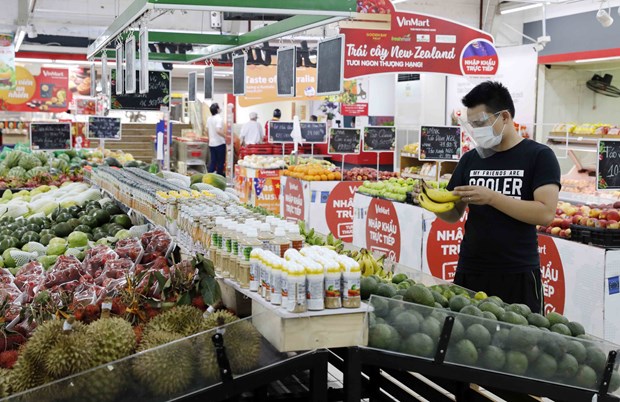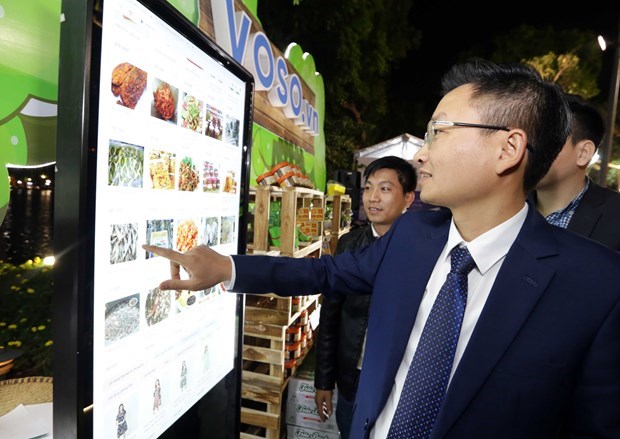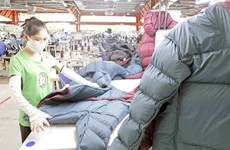Offline shopping to prevail post-COVID-19
 People buy goods at a Vinmart supermarket in Hanoi. (Photo: VNA)
People buy goods at a Vinmart supermarket in Hanoi. (Photo: VNA)Hanoi (VNA) - The COVID-19 pandemic has drastically changed the retail industry over the past two years. However, despite the 'boom' in online shopping during the pandemic, the thirst for offline shopping experiences will return, creating a new growth engine for the sector.
COVID-19 changes customers’ habits
In 2019, Do Huy Long, who lives in Hanoi’s Hoang Mai district, opened a mini supermarket to sell essentials at his home. As he ran his business very successfully and had a lot of customers, Long decided to set up another supermarket to distribute traditional agricultural products.
However, the COVID-19 pandemic ruined his plans. He had to constantly hire new employees and faced difficulty in the delivery of goods. As a result, the supermarket had to temporarily close during the distancing period.
Long isn't alone. Many other retailers have also faced supply chain challenges caused by the pandemic. Buyers and sellers couldn’t transact directly while the delivery of goods of small orders was also limited.
Thu Huong, the owner of a grocery store in Hai Ba Trung district, said that it was impossible to do business when the neighbourhood was isolated, due to the emergence of a positive COVID-19 case.
The store quickly switched to social networks and Facebook to make transactions more convenient but unfortunately, there was no shipper to deliver. Therefore, she had to temporarily close her store to avoid losses.
"The pandemic has changed both the way people purchase and sell the products. If they can't adapt, their stores have to close," Huong said.
Offline shopping still prevails
 A man shopping online on Viettel Post’s Voso.vn e-e-commerce platform. (Photo: VNA)
A man shopping online on Viettel Post’s Voso.vn e-e-commerce platform. (Photo: VNA)The pandemic has affected the entire production and business activities of enterprises, as well as the exchange of goods. Nevertheless, the pandemic didn’t cause big groups to shrink their operations but also witnessed a growth of brands with good vision.
MUJI, the Japanese household products and apparel chain retailer, is such an example. At the end of 2020, the Japanese giant opened its first flagship store in Ho Chi Minh City. Soon after, MUJI opened another 2,000 sq.m store - one of the largest stores in Southeast Asia at Vincom Center Metropolis, Hanoi.
Vinatex - a leading enterprise in Vietnam's textile and garment industry, also continues to expand selling points in the domestic market.
According to economic expert Dinh Trong Thinh, the booming trend of online shopping is inevitable, but it also reveals many shortcomings.
"Buying online lacks the most important experience in shopping, which is to touch a product and get advice to choose the most suitable and satisfactory product," he said.
More importantly, according to Thinh, shopping at stores doesn’t only satisfy the consumption needs of many people, but also is a way for them to enjoy the shopping space - something that is not available with online shopping.
With these advantages, many enterprises are constantly expanding their selling points and areas. The most important thing is to renovate their selling methods, aiming to satisfy the needs of customers.
Le Viet Nga, Deputy Director of the Domestic Market Department under the Ministry of Industry and Trade, said that despite the complicated development of the pandemic, the system of supermarkets, convenience stores, and retail of consumer goods in Vietnam is still growing fast.
For example, Saigon Co.opmart has opened more than 100 supermarkets nationwide, bringing the total number of retail points of this brand to nearly 1,000; Vincommerce has set up 123 Vinmart supermarkets and about 2,600 Vinmart+ stores and BRG Retail's system has about 100 supermarkets. Despite the negative impact of COVID-19 and the explosion of the online wave, the moves of these businesses show that the local retail industry is still full of potential and attractive, experts said./.












